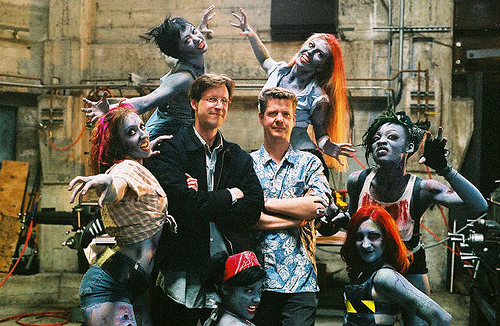
By Mr. Bishop
For those uninitiated into the world of homegrown filmmaking, Rick Popko and Dan West are the creators of one of the more instantly recognizable underground films, by name alone, of the last decade, Monsturd. Now, with thier newest film in the can and let loose on the world, the sentimental tale of a mentally challenged zombie apocolypse RetarDEAD, the San Fransico based duo kindly give us their time to give us insight into their filmmaking process.
Infini: Before we get on to the interview proper, let's clear the air. Would you like to react to any negative criticism of your films given by our site or any others? What is your philosophy on the criticism of your work?
Dan West: Each person is certainly entitled to their own opinion, and when you make a movie titled either Monsturd or RetarDEAD you'd better have a very thick skin in terms of negative reviews. We knew full well going into both movies that there was simply no way that they were going to be everyone's cup of tea. Whether they are funny or unfunny, wonderful or terrible, or even all four at once is really subjective to your sense of humor or mood at the time you view these things. We made the best movies we could with the resources we had at our disposal, which were minimal indeed. The best or worst part about that approach is that you only have yourself to blame if people hate your movies. There is no one else to blame and we certainly take full responsibility for the movies we release to the public.
Rick Popko: Honestly, I like having bad reviews. It helps to balance out the good ones. If all we got were good reviews, then peoples’ expectations start to get higher. That happened to me with “There’s Something About Mary” when it first came out. Everyone said that it was the funniest movie ever made. When I finally got to the theater to see what everyone was talking about I said, “That’s it? I didn’t think it was that funny.” But if you have both good AND bad, then people almost HAVE to see the movie so they can make up their own mind. The worst reviews are the ones where the critic’s sitting on the fence.
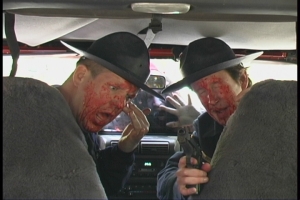
Also to reiterate what Dan mentioned, a lot of how you perceive a movie has to do with your frame of mind going into it. For example, there are times I can put Monsturd in and still laugh all the way through it. But honestly, there have been times when I’ve put it in and couldn’t get past the first 20 minutes before shutting it off and moving on to something else.
One thing that was interesting, we discovered, is that we found it helped to set expectations before people actually watch our movies. When we first started to send review copies out, all I sent was a DVD with a sticky note on it that simply said, “Here’s RetarDEAD. We hope you enjoy it.” and those first reviews weren’t very good. When we sent the movie with a letter that gave some background on the project and us, the reviews mysteriously started to improve. Suddenly instead of bagging on the movie for being super low budget and having lousy acting, they championed what we did considering our limited resources.
Infini: What got you into the business of low budget filmmaking, and who/what inspires you to go through the hassle of making films about Poop Monsters and Mentally Handicapped Zombies?
Dan: What got us into the business of low budget filmmaking was simply the drive to make movies and the knowledge that we acquired after years of trying to sell screenplays and get them made into larger budget affairs. When you take that approach you quickly learn that no one in "the business" gives a shit about you or your ideas and that if you want to see something realized you just have to do it yourself.
The upside to this is that you have the complete control to make whatever train wreck of a movie you want to. You could wear a pith helmet to the shoots and scream at your actors through a megaphone and no one can fire you, although I don't suggest that approach.
Rick: I used to be a writer at CNET. When I was there, I was fortunate enough to test one of the first miniDV camcorders that shot in frame mode (i.e. 30 frames progressive). While testing it, I brought it over to Dan’s house and we did some test shots. When Dan saw how the Frame mode looked on TV, his jaw dropped. He said “We could literally make a movie with this thing!” and that’s just what we did.
Infini: Why poop monsters and retarded zombies?
Rick: We ultimately want to sell whatever movie it is we make. We could have made a drama had we wanted to, but then the only people who would watch it would be us. No distributor today is going to look at a drama that’s low budget and has a bunch of non-actors in it. Horror, as a genre, tends to be very forgiving in that respect. Still, we didn’t want to just do another serial killer in the woods-type movie either. We wanted to do something that would help us rise above all of the other indie dreck that was (and still is) flooding the market place. We needed a gimmick. Something that people would remember for years to come.
Infini: I have to know, where did the idea for Monsturd come from?
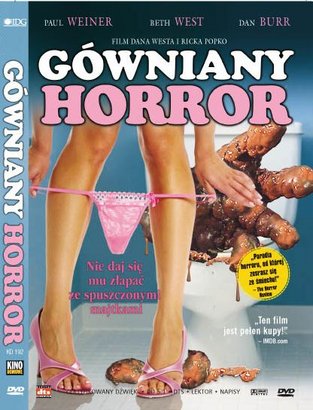 Dan : Rick can tell you all about that one.
Dan : Rick can tell you all about that one.
Rick: Monsturd was directly inspired by the film Jack Frost. Not the Michael Keaton family-friendly movie, but the one about a murderous snowman.
You have to understand our frame of mind. When Dan and I rented this movie, we had at that point been writing scripts and trying to sell them into H-Wood for about fifteen years or so. Between the two of us, I think we amassed something, like, 13+ feature-length scripts. These were good, legit ideas. We weren’t sending out stories about giant boogers and giant-breasted lactating aliens or anything like that. After 15 long years, we weren’t any closer to breaking into H-Wood. Was I bitter? Heck yeah!
Long story short, when I saw that a movie about a killer snowman had gotten into a legit video store, I started thinking that we were doing something seriously wrong. How can this get distribution while we can’t get anyone to even read one of our scripts? I was angry. Angry that I felt like I had wasted 15 years of my life on something that amounted to absolutely zero. The whole way home I was saying to myself, “You wanna release a movie about a killer snowman? Huh, Hollywood? Well, how about a movie about a giant killer shitman! Is that what you want? I bet you’d like that!”
When I got home I was so mad, I actually penned the first 25 pages of the script and called Dan to let him know that we should write this and then send it to all of the H-Wood studios as a joke. Dan thought I was crazy at the time and said I just needed some time to cool down.
Then we got our hands on the Canon GL-1 that I mentioned earlier, and a few days after that Dan called me and said, “Dude, you know that shit monster movie you were telling me about the other day?... I think we can do it… Using that camera… We can make the movie ourselves.”
And that’s how Monsturd was born.
Infini: While RetarDead doesn't resurrect the Poop Monster, it does resurrect, so to speak, Butte County, the backdrop of the first film. Do you want all of your films set here? Is Butte County the new Tromaville?
Dan: Well when you have a budget that wouldn't buy a day's craft services on a Hollywood Movie shoot, you have to inject something into the movies that makes people want to revisit your work. We think of this as a "mini franchise." RetarDEAD was our Jaws 2... but made for the price of a few sandwiches in Hollywood terms. It's like The X-Files for people with shitty taste in movies... much like Tromaville.
Rick: In fact we just decided that our third movie would take place in Butte County, too.
Infini: How did you get HGL and Jello Biafra involved, albeit briefly, in RetarDead?
Dan: I'd been bugging Herschell Gordon Lewis to work with me since the 1980’s. I could never raise any kind of reasonable budget to bring him on board anything. While we were working on Monsturd I wrote a script with him and David Friedman about their years working together as Exploitation filmmakers. The plan was to have Rick play Dave and I was going to play Herschell. Again, to pull off the production in the proper way was simply too expensive. The project didn't get made, but I had both Herschell and Dave doing the narration for the movie.
Herschell's was just audio, but I had paid to have footage shot of Dave Friedman, 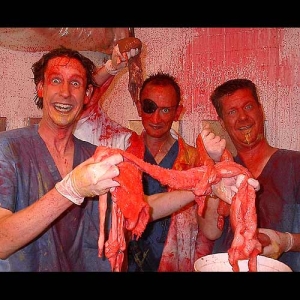 therefore he appears on camera for a few seconds.
therefore he appears on camera for a few seconds.
Herschell's voice over intro was from the other project and I asked him if he would mind letting us use a snippet for RetarDEAD and he graciously agreed, as did David Friedman. They are our exploitation forefathers, so I feel it's appropriate to have them both involved in some minor capacity.
Rick: With regards to Jello, he had read about a Monsturd screening in “The Guardian” (a local free weekly here in SF) at a local bar that was close to his house. He introduced himself afterwards and said he was a fan of Monsturd (one of his friends had shown him a copy) and wanted to come by and meet us. We chatted with him for over an hour outside the bar, and when all was said and done, he agreed to appear in our next flick. Even though RetarDEAD was pretty much in the can, Dan suggested that he could write a quick insert scene for him as the mayor denying that there’s a zombie plague ravaging his town. We called Jello up, pitched him the scene, and he said, “Sure!”
Infini: Do you have day jobs outside of filmmaking and if so, how does that change how you have to make your films?
Dan: If we didn't have day jobs we'd both be living in cardboard boxes. We've always had to work around work schedules and Rick being a father and having dad duties. It draws things out more than we'd like and is really the biggest hassle there is when you work on this level of production...but we've never worked any other way. We'd love to shoot a movie in three weeks rather than three years, but the day jobs and other life duties tend to get in the way.
Infini: What kind of budgets do you guys work with on these movies?
Rick: They’re pretty low. Monsturd’s production costs were about $3K. That went for the cop car rental, the Monsturd suit, costumes, realistic guns, some lights, plenty of DV tape stock, food and some gas. No one on the production was paid and we didn’t pay for any of our locations.
RetarDEAD on the other hand was our Citizen Kane. Our budget on that went up to $15k. On this outing, no one got paid except our special effects make-up artist Ed Martinez. While he gave us a deal on the effects he did for us, they did add up over time. We also spent more on food this time out, figuring if your not going to pay your actors, you better well feed them.
Infini: How does your limited budget effect the decisions you have to make (casting, FX, etc.) and your overall responsibilities on the film? Are you dependent heavily on favors and the generosity of others?
Rick: We try to get everything we can for free. For the most part we’ve been pretty successful getting some really talented people on board with us. The thing we’ve found is that people are typically pretty supportive of the arts. Just tell them they’ll get a credit in the movie and a DVD copy when it’s done. That’s how we got the cool car crash in RetarDEAD. We dropped by a local auto dismantling yard one day and asked the owner if he would mind smashing a couple of junker cars together for a shot in the flick and he said, “Sure thing!”
Infini: What hats do you wear on set and throughout the overall production of the film (pre, production, and post)?
Dan: We literally do everything save for the larger special effects and the music and sound mixing. Those are the things that are better left to others. As far the overall production, we do almost every single duty imaginable from crafts services to costume design to camera work...and on the last movie we even did a short piece of musical scoring for the "Frankenstein and the Bloody Beast of Ghastly Terror" trailer. I do a lot of the art direction, costume design, and things like the opening credit comic book drawings. I'm more geared toward the artistic side of production myself. Rick does the small.jpg) bulk of the organization, scheduling, securing locations, and budgeting special effects. He's much more the producer in that sense, and I function more as the art director. We both have our strengths and weaknesses and we think we balance each other out in that regard.
bulk of the organization, scheduling, securing locations, and budgeting special effects. He's much more the producer in that sense, and I function more as the art director. We both have our strengths and weaknesses and we think we balance each other out in that regard.
That's the advantage to working as a team. I could never pull off something like the Living Dead Girlz scene by myself. That's something Rick would need to put together.
Rick: We also don’t have a problem being our own extras. I believe Dan appears in RetarDEAD as at least 10 different characters. I play three or four extras.
Infini: Ha ha! Yeah, I noticed you guys all over the film. Overall, how long does a film take to make from writing until final cut with sound? Are you forced to space the production out because of budget and schedule availability of those involved or do you try and get it all done in one set shoot?
Dan: It varies wildly. Monsturd took a year to shoot and a year to put together in post. RetarDEAD, however, took five years from conception to post. If you were to ask us why it took that long, I don't think either of us could tell you. If we had had a crystal ball and it showed us the hell that we would encounter putting that thing together, we would have simply said "Fuck that" and not plowed ahead with that movie. It was a huge learning experience and therefore before we enter into production on the next movie, were are going in highly prepared, which is something we were not on that last movie. We started with about 45 minutes of script and kept re-writing the ending as we went.
This is something we will NEVER do again. There's no reason a movie should take five years to make. It wasn't as if we were making Ben Hur, but we also had a lot of personal problems going on with our cast. I went through a divorce with the leading lady of RetarDEAD during the production of the film. so that was odd. One of our lead actors was having terrible drug problems that made shooting difficult. We went through some battles on that movie.
Infini: What do you guys shoot on and what are some advantages and disadvantages shooting in this format?
Rick: We shot Monsturd and RetarDEAD on a Canon GL-1 set on “frame” mode, which helped to give the movies more of a film-like look. We recently purchased a Canon A1 HD camera for our next flick.
The advantages of shooting in DV is that it’s cheap. An hour of miniDV tape stock costs about five bucks. Compare that to how much an hour of 16mm film costs, plus doing work prints, negatives, masters, dupes etc. It can get expensive pretty fast.
Another advantage to miniDV is that the cameras are less intimidating than most 16mm cameras with their big, imposing lenses and magazine cartridges sticking out on top. We’re able to get more relaxed performances from our non-actors. Also, because MiniDV tape is so cheap, we can let the camera roll on our actors until they say the line right… which of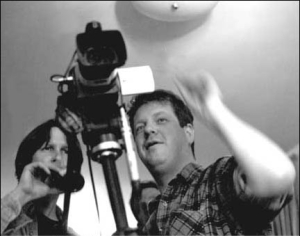 course can be a disadvantage, too. Especially in post when you have to sift through 15 takes of an actor trying to get one simple line right. There were times when we were editing RetarDEAD that Dan and I wanted to pull our hair out. People crap on the acting in our movies, but I think the performances are really much better than people give them credit for. Especially considering no one in our movies are professional actors.
course can be a disadvantage, too. Especially in post when you have to sift through 15 takes of an actor trying to get one simple line right. There were times when we were editing RetarDEAD that Dan and I wanted to pull our hair out. People crap on the acting in our movies, but I think the performances are really much better than people give them credit for. Especially considering no one in our movies are professional actors.
Another advantage with miniDV is that you can shoot pretty much anywhere. If you’re shooting film, you have to have lug around all kinds of bulky gear. It also takes forever to set up a shot for film. With miniDV you can jump out of your car, put your actors in a scene, shoot it in two minutes, jump back in your car and speed off to the next location. With this approach you don’t call attention to yourself and can skirt by without getting any film permits. If a cop stops you and asks what you’re doing, you simply say, “I’m making a student film.” They then smile, nod their heads and leave you alone.
Infini: For us amature filmmakers and tech geeks, would you care to explain how you guys go about postproduction and what you use?
Rick: We posted RetarDEAD on an Dell PC with Windows XP. It has something like 500MB RAM. Our editing software was Adobe Premiere 6.0. We used a Pinnacle Systems Pro-One capture board. We also used another Dell that had Pinnacle’s Studio software on it to rough cut footage before bringing it into Premiere. So our workflow went something like this:
Capture miniDV footage to Dell with Pinnacle Studio. Rough cut it, then export it back to miniDV, then digitize that footage over to the other Dell for fine tuning in Premiere.
When we had edited five or so minutes of the movie, we would export that chunk back to miniDV (that was our back-up in case of drive failure). Because version 6 of Premiere wasn’t really cut out to do long form editing, we had to edit the movie in chunks. We’d get to 10 or 12 minutes on the timeline and then the application would become really unstable. We would then need to open up a new timeline to begin editing the next 10 or 12 minutes of the movie. I think the entire movie was cut on 7 different timelines. When we were ready to create our final master, we would export all of our timelines out to miniDV and then re-captured them on our final hard drive. We then imported all of those videos into the final timeline and added our final audio mix. Lastly, we rented a DVCam deck from our local video shop and exported the movie right from the project timeline to the deck.
Infini: Due to a comment I made in my review of RetarDead, you and I had a conversation about an issue you had with the loss of sound and the difficulties of rounding up actors for ADR. Would you like to address what it is like for a low budget film to fix any unforeseen problems in post when people move on after the film is shot, and creatively how you deal with these problems?
Rick: In a perfect world, you’re going to have a sound guy on your set. Their only job is to make sure that audio you’re capturing is good. But, on our budget level, we didn’t have that luxury and, obviously, as you point out in your review, it cost us.
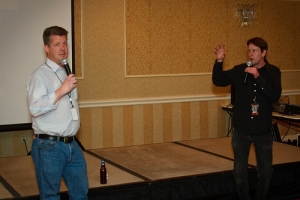 Most of the time Dan and I are pretty good when we’re behind the camera. When we shoot, we wear headphones so we can hear everything clearly. We have a pretty decent shotgun mic. When a plane files over, we stop shooting until it passes. That warehouse scene, however, presented some auditory challenges. The warehouse was cavernous, so everyone’s lines had an echo to them. The echo made it sound like the audio we were getting was louder/hotter than it was. So we pulled the mic back from our actors.
Most of the time Dan and I are pretty good when we’re behind the camera. When we shoot, we wear headphones so we can hear everything clearly. We have a pretty decent shotgun mic. When a plane files over, we stop shooting until it passes. That warehouse scene, however, presented some auditory challenges. The warehouse was cavernous, so everyone’s lines had an echo to them. The echo made it sound like the audio we were getting was louder/hotter than it was. So we pulled the mic back from our actors.
We didn’t start editing that scene for probably four or five months after the shoot. So when we were editing, we were using a simple pair of computer speakers that normally come with a new PC. The audio sounded okay through those. It wasn’t until our sound guy came over with a DVD mix of the final movie that we noticed how bad the audio was in that scene. By that time, our lead actor had moved to Texas. We tried to clean it up as best we could. As Dan says, “That scene is the Achilles’ heel of our movie.” Needless to say, that kind of mistake will not be made again.
Infini: When all is said and done, what is your favorite thing about filmmaking? What is the overall goal with your films?
Dan: The best thing about filmmaking is the sheer adventure of going out and doing these insane things that you would normally never do in "real life." No matter what the end result is, you will always have those adventures to remember fondly. It's hard work, but it's also a hell of a lot of fun running around like an insane person doing crazy things and then putting those things in a movie for all to see.
As far as overall goals, we're just happy that there is an audience for our little exploitation movies. We'd love to make something on a bigger budget, but if that doesn't happen that's fine too. It's really all about the experience and fun of creating your own movie using the resources at your disposal. Of course if no one wanted to see these things, we'd probably have a different attitude, but oddly enough those movies do have their following and that's a nice payoff.
Rick: My favorite thing about filmmaking is that it’s a shot at immortality. It makes me smile to think that when I die, our movies will still be out there entertaining people. The other thing that’s fun is watching what your movie does when it’s finally out there. Making a movie is like birthing a child. When you turn that child over to a distributor, it’s like sending you little baby away to college. You hope he goes on to be successful at what he does and doesn’t end up moving back in with you. It’s been fun to watch reviews of our movies appear on foreign Websites. Our movies have been to countries neither of us have ever been to. If it wasn’t for RetarDEAD, we wouldn’t have been invited to this year’s Texas Frightmare Weekend. And if it wasn’t for these crazy movies, we wouldn’t have the opportunity to do an interview like this one.
What is up next for you guys? Are you working on the next film or are you just resting a bit until the next film plops in our heads? (sorry)
Dan: We are writing the next movie now. It will be another sequel and so far involves a Satanic cult and one real asshole of an alien from another world. It will be shot in High Definition and, yes, it will take place in Butte County.
Please feel free to discuss "Rick Popko and Dan West's Interview " here, in our forums!

